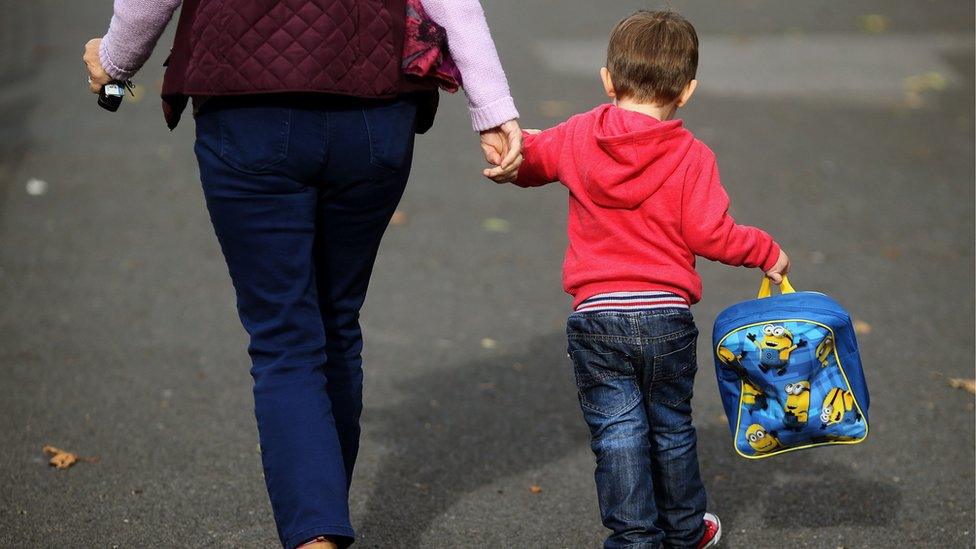Coronavirus: Children affected by rare Kawasaki-like disease
- Published
- comments

Scores of UK and US children have been affected by a rare inflammatory disease linked to coronavirus.
In a tiny number of children it can cause serious complications, with some needing intensive care.
Up to 100 children in the UK have been affected and studies suggest the same reaction is being seen in children elsewhere in Europe.
It is likely to be caused by a delayed immune response to the virus which looks like Kawasaki disease.
In April, NHS doctors were told to look out for a rare but dangerous reaction in children.
This was prompted by eight children becoming ill in London, external, including a 14-year-old who died.
They all had similar symptoms when they were admitted to Evelina London Children's Hospital, including a high fever, rash, red eyes, swelling and general pain.
Most of the children had no major lung or breathing problems, although seven were put on a ventilator to help improve heart and circulation issues.
Doctors are describing it as a "new phenomenon" similar to Kawasaki disease shock syndrome, external - a rare condition that mainly affects children under the age of five. Symptoms include a rash,, external swollen glands in the neck and dry and cracked lips.
But this new syndrome is also affecting older children up to the age of 16, with a minority experiencing serious complications.
Dr Liz Whittaker, clinical lecturer in paediatric infectious diseases and immunology, at Imperial College London, said the fact that the syndrome was occurring in the middle of a pandemic, suggests the two are linked.
"You've got the Covid-19 peak, and then three or four weeks later we're seeing a peak in this new phenomenon which makes us think that it's a post-infectious phenomenon," she said.
This means it is likely to be something related to the build up of antibodies after infection.
'Exceptionally rare'
Prof Russell Viner, president of the Royal College of Paediatrics and Child Health, said the majority of children who have had the condition have responded to treatment and are getting better and starting to go home.
The syndrome is "exceptionally rare", he said.
"This shouldn't stop parents letting their children exit lockdown," Prof Viner added.
He said understanding more about the inflammatory disease "might explain why some children become very ill with Covid-19, while the majority are unaffected or asymptomatic".
Children are thought to make up just 1-2% of all cases of coronavirus infection, accounting for less than 500 admissions to hospital.

SCHOOLS: When will children be returning?
LOOK-UP TOOL: How many cases in your area?
GLOBAL SPREAD: Tracking the pandemic
RECOVERY: How long does it take to get better?
A SIMPLE GUIDE: What are the symptoms?

Michael Levin, professor of paediatrics and international child health at Imperial, explained that most of the children tested negative for coronavirus, but tested positive for detection of antibodies.
"So we really think that the biology of the disease, somehow involves an unusual immune response to the virus," he said.
However Prof Levin said there was "a vast amount to learn" about the reaction, which had only been known about for two to three weeks.
Children appear to be affected up to six weeks after they have been infected with the virus, which could explain the appearance of the new syndrome several weeks after the peak of UK cases.
What is the situation elsewhere in the world?
There have been similar cases in the US, Spain, Italy, France and the Netherlands.
At least 15 US states are looking into the rare condition, according to New York governor Andrew Cuomo.
Out of 82 diagnosed cases of the inflammatory syndrome in New York, 53 children tested positive or had antibodies for Covid-19.
The Centers for Disease Control (CDC) in the US is set to issue an alert and updated definition of the syndrome to healthcare providers this week.
Meanwhile, according to a study by doctors in northern Italy, external, 10 children have been affected by the disease.
All 10 of the children in the study were admitted to a hospital in Bergamo - the city at the centre of the worst outbreak in Italy - between mid-February and mid-April, and recovered.
The children, who had an average age of seven, tended to have severe symptoms such as heart complications and signs of toxic shock syndrome. They also needed additional treatment with steroids.
In antibody tests on the children, eight appeared to have already had the coronavirus while the other two had not. But the researchers said the tests were not 100% accurate. Swab tests to detect the virus are not thought to be useful because the reaction tends to occur many weeks after infection.
Dr Lucio Verdoni, report author and doctor at the Hospital Papa Giovanni XXIII in Bergamo, said: "Although this complication remains very rare, our study provides further evidence on how the virus may be affecting children."
Child health experts in the UK say it may not be something which just affects children.
They are now working with researchers in the US and across Europe to find out more about what they have called paediatric inflammatory multisystem syndrome or (PIMS-TS).